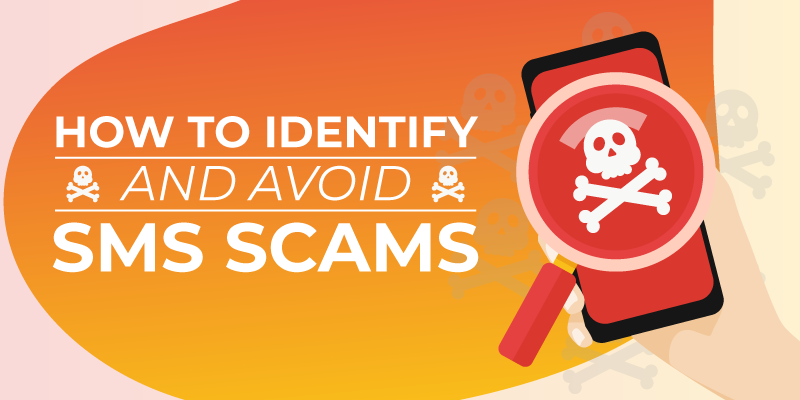Have you received a text message from an unknown number promising a certain amount of money or prizes after clicking a certain link? If yes, you’ve most likely become a target of an SMS scam.
These deceptive text messages have recently become prevalent in the Philippines, putting unsuspecting individuals at risk of exposure to financial loss and personal information.
From lottery and investment fraud to fake charity appeals and phishing attempts, the range of SMS scams is alarmingly vast. In this blog, we’ll dive deeper into the gravity of SMS scams in the Philippines and teach you how to protect yourself against them.
Understanding SMS Scams in the Philippines
SMS scams occur when scammers send text messages to mobile phone users, tricking them into sharing personal information, making money transfers, or getting involved in malicious schemes.
A 2023 study found that of all the fraud cases that Filipinos report, 46% are smishing or SMS scams.
It has gotten so bad that text scammers have already claimed millions of dollars from network subscribers who ended up clicking on malicious links and giving up sensitive data.
Local telecommunication companies have since tightened security measures to protect their subscribers from digital fraud.
For instance, Globe Telecom blocked 1.3 billion text scams from January to September 2022, a 13% increase from 1.15 billion blocked text scams in 2021. On the other hand, Smart blocked only website links that led to malicious sites.
The Philippine government has also enacted the SIM Card Registration Act, which requires mobile device users to register their SIM cards and helps authorities protect individuals from smishing activities.
Types of SMS Scams in the Philippines

SMS scams vary in form, sometimes making distinguishing them from real text messages from network service providers and brands difficult. Here are the types of SMS scams you should watch out for.
-
Lottery and prize scams
The scammer will claim that you won a raffle or are eligible for a prize like cash, a car, a travel package, or a house. They’ll also instruct you to call a specific number, asking you to send money or load credits before claiming your winnings.
-
Investment scams
This scam involves enticing you to invest in fake or non-existent investment opportunities. These scams often promise high investment returns and may claim affiliation with reputable financial institutions or companies.
-
Identity theft and phishing scams
The scammer will claim to be a legitimate organization’s or financial institution’s representative and ask for sensitive information such as your login credentials, credit card or bank account details, and one-time passwords (OTPs).
With this data, they’ll access your bank accounts, make unauthorized transactions, or commit identity theft.
-
Missent load scam
An unknown number will send a text message mimicking a prepaid load notification. Moments later, the scammer will claim that the load was mistakenly sent to you and insist you return it.
In reality, you did not receive any prepaid load credits; the scammer is only tricking you into giving them your existing credits.
-
Discount billing scam
The scammer will falsely claim you qualify for a discount on your postpaid bill. However, the message intends to deceive you into sending prepaid load credits to an unfamiliar number. Scammers usually target postpaid subscribers for this scheme.
-
Final warning to register sim card
This scam involves falsely pressuring you to register your SIM card via a malicious site. The scammer will usually pose as your bank or network service provider.
Risks Involved in SMS Scams
You may experience severe consequences for falling victim to an SMS scam. Here are some of the risks involved in fraudulent text messages.
-
Financial loss
You may directly lose money through unauthorized charges on your accounts or bank transfers to the scammer. You may even have difficulty recovering the lost money or permanently lose your funds if you can’t prove that you did not authorize these transactions.
-
Identity theft
The scammer may assume your identity using your personal information to commit fraud. Identity theft can result in financial damage, damage to credit scores, and a long and complex process to restore your identity.
-
Unauthorized access to personal information
The scammer may commit financial fraud, breach your privacy, or blackmail you using your personal information.
-
Psychological impact
You may feel embarrassed, ashamed, angry, or betrayed for falling for an SMS scam. You may also no longer trust digital communication channels or brands that use SMS marketing to communicate with you.
Avoiding SMS Scams
Identifying and avoiding SMS scams requires a proactive approach and attentiveness to potential red flags. Here are some tips to prevent and protect yourself from SMS scams.
-
Be cautious of unsolicited messages
Be wary of text messages from unfamiliar numbers or unexpected sources. Scammers often send unsolicited messages to initiate their fraudulent activities.
-
Verify the sender’s identity
If you receive a text claiming to be from a specific organization or company, take the time to verify the sender’s identity independently. Contact the organization through official channels or visit their website to confirm the message’s legitimacy.
-
Scrutinize message content for suspicious elements
Look out for spelling or grammatical errors, unusual requests, or messages that create a sense of fear or urgency. These signs point to a potential scam.
-
Avoid clicking on links or downloading attachments
Don’t click links or download attachments sent via SMS unless you trust the sender or source or have vetted their legitimacy. Scammers use these tactics to lead you to malicious websites or infect your device with malware.
-
Don’t disclose personal information
Be cautious about sharing personal information such as your bank account details, passwords, or other sensitive data through SMS. Legitimate organizations would not typically ask for such information via text.
-
Install reliable security software on mobile devices
Security software or applications specifically designed for mobile devices can help detect and block potential threats, including SMS scams and malware.
-
Regularly update device software and applications
Keep your mobile device’s operating system and all installed applications up to date. Software updates often contain important security patches that address vulnerabilities that scammers may exploit.
-
Be mindful of privacy settings on social media platforms
Adjust your privacy settings on social media platforms to limit the amount of personal information that’s publicly visible. Doing so reduces the chances of scammers obtaining your details they can use in SMS scams.
-
Learn more about common SMS scam tactics
Stay informed about the various tactics and techniques scammers employ in SMS scams so you can recognize and avoid falling victim to them.
Be Aware of SMS Scams
Stay alert and careful with text messages to protect yourself from SMS scams. Don’t trust suspicious messages, avoid sharing personal info or making transactions solely based on texts, and verify any claims or offers you receive through SMS.
If you encounter them, report SMS scams to the appropriate authorities like the National Telecommunications Commission (NTC) or the Philippine National Police (PNP) Anti-Cybercrime Group. Contribute to the collective effort in combating fraudulent activities.
Contact NTC
- +632 8920 4464
- +632 8926 7722
- +632 8921 3251
Contact PNP Anti-Cybercrime Group:
- +632 8414 1560
- eComplaint Desk: https://acg.pnp.gov.ph/eComplaint/
If you’re running a business and don’t want to lose your SMS subscribers due to these scams, work with an enabler of trusted SMS marketing for businesses like Semaphore.
Our data-driven SMS marketing solutions ensure your messages are tied to your business name instead of an ordinary phone number, assuring your subscribers that they directly and only engage with you.
Contact us today to strengthen your SMS marketing efforts!


